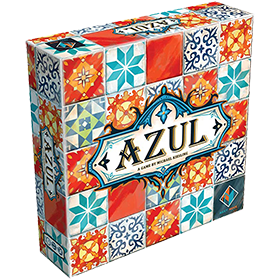azul
 Introduced by the Moors, azulejos (originally white and blue ceramic tiles) were fully embraced by the Portuguese when their king Manuel I, on a visit to the Alhambra palace in Southern Spain, was mesmerized by the stunning beauty of the Moorish decorative tiles. The king, awestruck by the interior beauty of the Alhambra, immediately ordered that his own palace in Portugal be decorated with similar wall tiles. As a tile-laying artist, you have been challenged to embellish the walls of the Royal Palace of Evora.
Introduced by the Moors, azulejos (originally white and blue ceramic tiles) were fully embraced by the Portuguese when their king Manuel I, on a visit to the Alhambra palace in Southern Spain, was mesmerized by the stunning beauty of the Moorish decorative tiles. The king, awestruck by the interior beauty of the Alhambra, immediately ordered that his own palace in Portugal be decorated with similar wall tiles. As a tile-laying artist, you have been challenged to embellish the walls of the Royal Palace of Evora.
In the game Azul, players take turns drafting colored tiles from suppliers to their player board. Later in the round, players score points based on how they've placed their tiles to decorate the palace. Extra points are scored for specific patterns and completing sets; wasted supplies harm the player's score. The player with the most points at the end of the game wins.
Niver a c'hoarierien: 2 - 4
Padelezh ar bartienn: 11 mn
Kemplezhded : 1 / 5
C'hoari da azul pe da 1223 c'hoari all enlinenn.
Pellgargañ ret ebet - c'hoariit war-eeun adalek ho merdeer.
Gant ho mignoned ha miliadoù c'hoarierien/ezed en hollved.
Evit netra.

C'hoari da azul pe da 1223 c'hoari all enlinenn.
Pellgargañ ret ebet - c'hoariit war-eeun adalek ho merdeer.
Gant ho mignoned ha miliadoù c'hoarierien/ezed en hollved.
Evit netra.

Diverradenn ar reolennoù
Azul is a game about picking up sets of tiles to build a mosaic wall.
Setup
- Each player's board starts on its colored side. Each player starts with 0 points.
- Place 5 factory displays for 2 players/7 for 3 players/9 for 4 players in a circle in the center of the playing area.
- Place 20 tiles of each color (white, red, yellow, blue, black) into the bag. Then fill each display with 4 tiles.
Gameplay
- The starting player places the starting player marker in the center of the table and starts the first turn of the round.
- On your turn, pick all tiles of the same color from one of the groups in the "display" or the "center". If you pick from a group in the display, move the rest of the tiles in that group to the center. If you are the first to pick from the center this round, take the starting player marker and place it on your "floor line" (which will cost you one point during scoring a round).
- Then, add the tiles to a "pattern line" (first line 1 space, second 2 spaces and so on). A line can only hold one color. When you complete a line it will move from the "pattern line" to the line on its right to the wall. You can only put one tile of each color into each row of your wall, so you cannot put tiles into your pattern line if you have already completed that color in that row in your wall. If you picked up more tiles than can fit in your pattern line, the rest goes to your floor line (which will cost you points during scoring a round). Once the floor line is full, unusable tiles are discarded.
Scoring
The end of a round is when all tiles are taken. At that point check your pattern lines from top to bottom. If a line is complete, move the rightmost tile to the corresponding place, score accordingly and discard the rest from that line. Else, those tiles stay in your pattern lines for the next round.
- Each new tile is immediately scored.
- If there are no adjacent tiles, score 1 point.
- If there are adjacent horizontal tiles, score 1 point for each tile in the horizontal row linked to that tile, including the tile you just placed.
- If there are adjacent vertical tiles, score 1 point for each tile in the vertical column linked to that tile, including the tile you just placed.
- If there are both adjacent horizontal and vertical tiles, then perform both of the above two scoring steps. In this manner the tile you just placed gets scored twice.
- Next, if you have any tiles in your floor line, lose points accordingly. Remove them (except the starting player tile) afterwards. Your score cannot be less than 0.
Prepare for Next Round
If no player has a horizontal line of 5 tiles on their wall, refill each of the displays with 4 tiles from the bag. If the bag is empty, refill the bag with the discarded tiles. In the rare case that insufficient tiles have been discarded, the next round will be played with some unfilled displays.
End of the Game
- The game will finish at the end of the round in which one or more players have completed an horizontal line of 5 tiles.
- Score 2 points for each horizontal line of 5 tiles.
- Score 7 points for each vertical line of 5 tiles.
- Score 10 points for each color with 5 tiles on the wall.
- The player with the most points wins the game. If there is a tie, the player with more completed horizontal lines wins.
Variant option (gray board)
The main difference is that in the placing phase you can decide which column of each line to put your tile in. Note that you can't place tiles of the same color in the same column or line.

